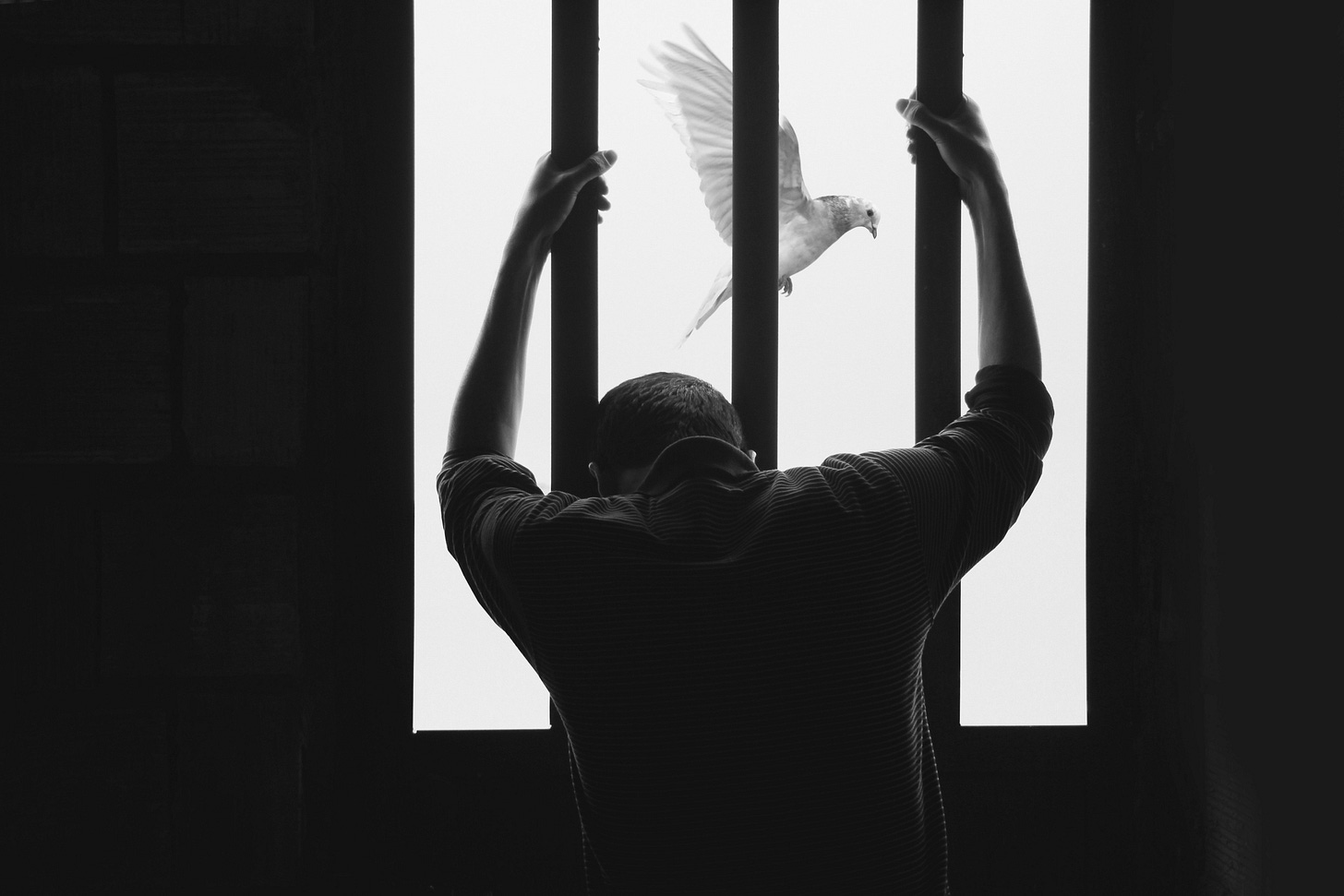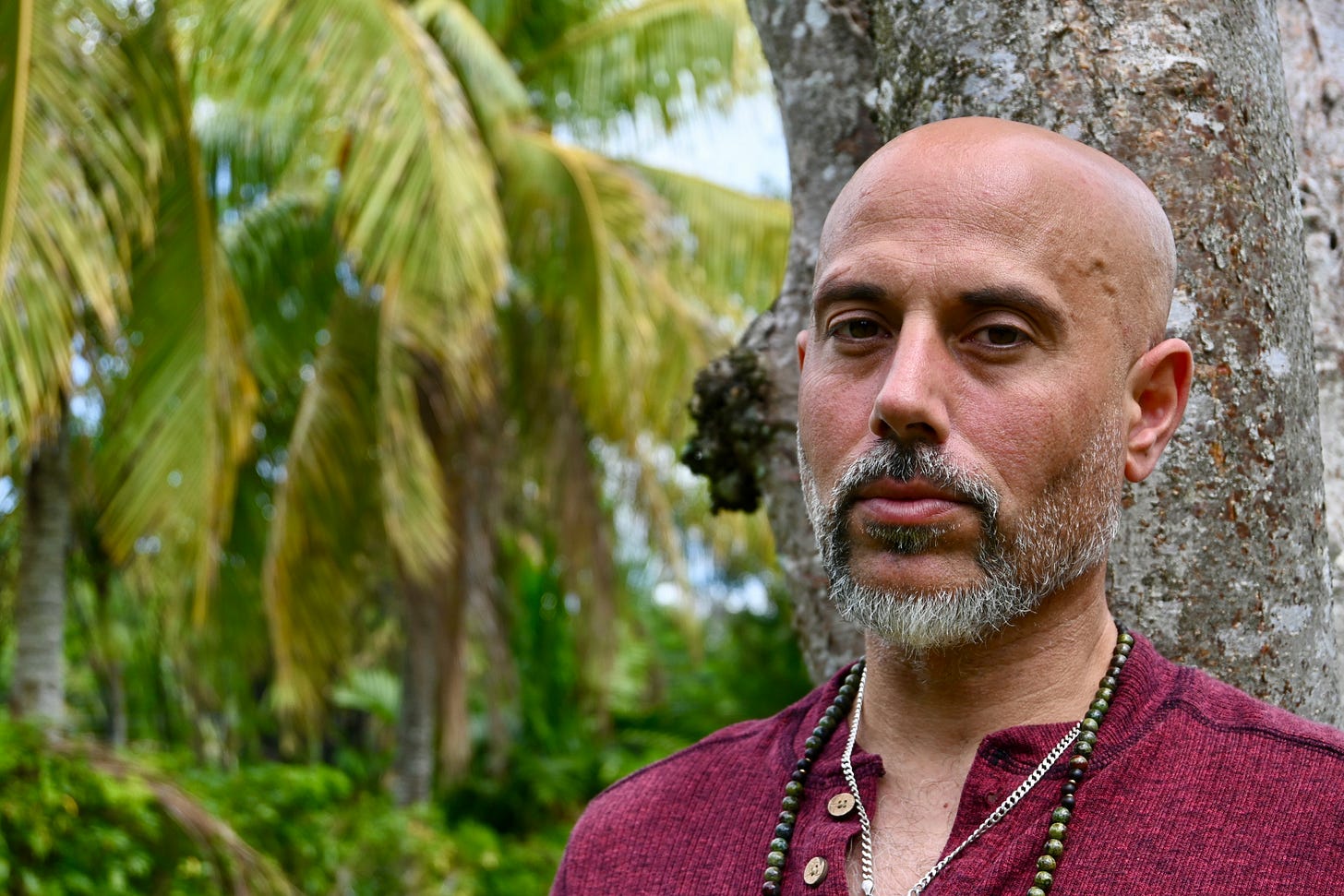The Two-Inch Glass
An Essay by Theodore Richards
“The Two-Inch Glass, 2000” An excerpt from What Happened to Icarus: Encountering the Unfathomable in a World in Crisis (Wayfarer Books, March 2026)
“Where you going?” the officer says gruffly.
“Division six,” I answer blankly.
The officer says nothing. He looks over my documents. He finds no reason to deny my entry.
“You can’t enter with this,” says the woman to my side who has been searching my bag, holding up an aerosol can.
I take my bag and return to my car, where I leave everything that would prevent me from entering. I return in a few moments, show them my identification card, and resubmit to a search. The officer pats me down after I pass through the metal detector.
“To the right and out the door,” he tells me.
This is like entering a foreign country, I think as I walk down the dark corridor. No, this is more difficult than that. It is like entering a foreign world. It is inside of the world we know, hidden.
The hallway leads to a door to a courtyard. Not knowing where I am going, I enter the first open door I encounter.
The room is poorly lit and dingy. There are a dozen people sitting in plastic chairs nailed to the floor in neat rows. They do not talk, or read; they stare straight ahead, blankly and sadly, all of them. A woman in uniform sits behind a gate. I can barely see her in the drab and dirty darkness. She asks me whom I have come to see.
I answer, giving a name that feels odd in its formality.
The woman shuffles some papers. “Have a seat,” she says, neither kind nor unkind. “Wait for his name to be called.”
I sit down among the others. They are a depressing bunch: mothers and fathers; wives and brothers. They have all come to see someone they love who is incarcerated. Their faces are as gray and gloomy as the room.
I wait for about a forty-five minutes. His name is the first to be called. They open a heavy and terrifying iron gate to let me enter. I see Dee to my left as I am led to another room. My identification is scrutinized again. Finally, I am allowed into the visitation room. Dee sits behind two-inch, bulletproof glass, the kind found in hole-in-the-wall fast food places. He is smiling, surprised to see me. His hair has been cut short—he had long dreadlocks the last time I saw him, perhaps a month ago. He looks healthy and strong. He has been eating better there than he ever did when he was free.
In order to talk, we have to put our mouths and ears close to the glass and speak loudly. We make small talk at first. He tells me he has been doing well; he is in good health. In time, more visitors enter, each shouting into the tiny holes in the two-inch glass. It becomes noisy and nearly impossible to hear.
I tell him, after about a half hour, that I have to leave. I won’t see him for a while, for I am leaving the country next week. I tell him I will be in Asia. He smiles. I am not sure if he even knows where Asia is; and even if he does know, it is so far beyond his world that it does not matter. It might as well be the moon.
Dee puts his hand up to the glass. I put mine up too, mirroring his. We imagine they touch.
I have known Dee for several years before he is arrested for the murder of his mother. I would see Dee wandering the streets. In time, I come to know him; he becomes a part of my circle of friends.
Hyde Park is one of the South Side’s most affluent and integrated neighborhoods. Dee comes regularly to escape the violence of his own neighborhood. There are times when he hears the gunshots on his way home and turns around to sleep in the park; other times he is robbed.
Dee’s home fluctuates between the streets and his mother’s place. Sometimes he prefers homelessness: his mother is plagued by addiction; his neighborhood is gang-ridden; and his mother’s home is rat-infested and unwelcoming. But he harbors no bitterness toward his mother. “She ain’t too strong,” he tells me once. It is the closest he ever comes to criticizing his mother in my presence, but it is said with affection. It is an explanation for his mother’s problems—an excuse, not a condemnation.
Dee has little formal education and few prospects for employment. Often he comes by hungry—we try to give him what we can. He gets a job selling “Streetwise”, a newspaper sold by Chicago’s homeless. He sells incense and oils. He is arrested a few times for selling the latter without a license. He would have had to stop eating for several days to afford such a license.
And Dee walks. Through Chicago’s harsh and bitter winter, he walks; he walks through Chicago’s brutal and violent neighborhoods. Dee crosses borders in Chicago: from one gang territory to another; and from his own poor, black neighborhood to the white and black-middle-class neighborhood of Hyde Park. Dee has nothing, but his feet; his only gift, it seems, is his ability to walk these forbidding streets freely.
A few months before I am to leave Chicago, and America, Cosmos receives a knock on his door. It is the police. They ask him if he knows a man named Corinthians Dee Bell. He isn’t sure. None of us have ever known him by any other name than “Dee”. But he figures out who it is.
A few nights ago, Dee’s mother was stabbed to death, they tell him. Dee has been arrested.
It is Dee who finds his mother covered in blood. It is no single stab wound that kills her, but a multitude, too many to count. I have thought about how I would have responded if I had been in Dee’s situation. My imagination has come up with nothing.
In shock, in horror, Dee does nothing at first. When he regains his composure, he takes the money in his mother’s house and leaves. Later, he calls the police.
The police have said that the money was the motive for the crime, that Dee killed his own mother to steal from her. But of course, the truth is always deeper than appearances; or, rather, sometimes, the truth is shallower. The truth is as shallow as a man’s clothes and skin. Dee is poor and uneducated, with little chance to defend himself successfully in court; he is big and dark-skinned, fitting society’s image of a criminal, a murderer.
I have broken bread with Dee. He has been to my home. I can never have known his innermost thoughts, the depths of his soul. But I know him as more than his clothes and his skin. He is not a shadow, to me, drifting namelessly through the city streets. He is human.
We stand up, for a moment, facing one another. The windowless visitation room is crowded now. On both sides of the divide, mouths and ears are pressed against the two-inch glass. The small room is filled with noise. I am sure no one could hear anything that is said. I have stopped trying.
We say goodbye to each other—this is the word that does not need to be heard to be understood—and I leave. As I leave the building, the guard is arguing with a Mexican kid about his hat. Hats, which represent gang affiliation in Chicago, are not allowed. The August sun shines brightly as I walk away, toward my car. There were no windows inside.
I walk away not only from the Cook County Jail, but also from the darkness, from Chicago, from attachment, from limitation. I am free. I can leave. My imminent departure intensifies, in my own mind, the cruelty of Dee’s incarceration.
I will cross so many borders. Most people I know in Chicago, most people I will encounter on my journey, will never cross an international border in their lives.
And there are other borders, more subtle but no less real, that I will be privileged to cross.
It does not yet occur to me then that Dee’s existence has always been about crossing borders. He has spent his time with privileged University students. He has walked.
But there, as I get into my car and drive off, I feel the impassibility of the borders of his world now. The two-inch glass does not move. He has no passport, no way to move on, to continue his walk. And I feel the unknowability of him to me, and I to him. This crushes me with sadness.
As I begin my journey, in which I will seldom cease to move, Dee remains static in my mind, always staring out at me, through the two-inch glass.
Theodore Richards (he/him) is an educator, poet, and philosopher, and the founder of The Chicago Wisdom Project. His work is dedicated to re-imagining education and creating new narratives about our place in the world. He has received degrees from various institutions, including the University of Chicago and The California Institute of Integral Studies, but has learned just as much studying the martial art of Bagua; teaching in various settings and students; and as a traveler from the Far East to the Middle East, from southern Africa to the South Pacific. He is the author of eight books and numerous literary awards, including two Nautilus Book Awards and three Independent Publisher Awards. He lives on the south side of Chicago with his wife and three daughters.



